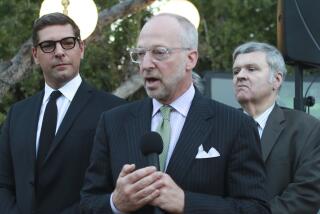Garcetti Granted Budget Increase : Government: Compromise is struck as supervisors vote $3.8-million raise to save threatened programs. In exchange, district attorney agrees to restore other units.
- Share via
Moving to dampen the fractious budget standoff with Dist. Atty. Gil Garcetti, the County Board of Supervisors on Tuesday agreed to increase Garcetti’s budget by $3.8 million so that he can maintain several specialized crime units threatened with closure.
In addition, the board lifted a hiring freeze that had prevented Garcetti from using outside grant money to set up special units to prosecute real estate and food stamp fraud.
In return, Garcetti agreed to restore and maintain divisions that prosecute major fraud, environmental crimes, auto insurance fraud, consumer protection and worker safety violations at least through the 1994-95 fiscal year. Garcetti also promised to live within whatever budget the board adopts for the next fiscal year, as long as it is not below his current allocation.
The compromise agreement was hailed by environmental activists, labor groups and others who had criticized Garcetti’s threat to end prosecution of white-collar and nonviolent crimes.
“This is a very positive move,” said Tim Frank, vice chairman of the Southern California-Nevada chapter of the Sierra Club. “The closure of these units could have been really devastating. L.A. County is one of the top three hazardous chemical-producing counties in the country. The air here is more polluted than anywhere. This is a dangerous place for us to allow violators to go unprosecuted.”
Garcetti, in an interview Tuesday, said that even with the increased budget, the department will have to evaluate all of the specialized units and may have to reallocate resources from one to another to keep them running.
“This allows us to continue the prosecution of most of the cases,” he said. “We can hire some lawyers and investigators, but we still have a large number of vacancies that need to be addressed.”
But Garcetti praised the board for its action.
“The board, to their credit, recognized that we really are understaffed,” he said. “They came quite a distance in recognizing the real need of our department. I think there is a real spirit of cooperation here--on their part and on my part too.”
The friendly words were in stark contrast to the increasingly hostile debate that had been engendered by the board’s demand that Garcetti live within his budget.
The district attorney had acknowledged overspending his $119-million budget by about $3.8 million. Supervisors had been adamant that Garcetti must stay within his budget limitations, imposing the strict hiring freeze.
Garcetti then announced that he would shift prosecutors from specialized units that prosecute nonviolent crimes to those that handle street crimes.
Last month, Garcetti stopped accepting new cases involving environmental crimes, workers’ compensation violations and major fraud because of staffing shortages in those units. He threatened to close them entirely by July 1 if he could not get more money and staff.
The decision prompted Supervisor Gloria Molina to propose authorizing an independent negotiator to explore ways of securing outside funds to save the specialized units--a proposal Garcetti had strongly opposed.
But in a surprise motion Tuesday, Supervisor Ed Edelman won agreement on a compromise, which was apparently brokered late Monday. Molina, who has butted heads frequently with Garcetti about his overspending, called the deal a “cave-in” on the county’s part.
“I think he created a lot of stress and pressure for a lot of board members, but I have seen no confirmation that he is willing to live within his budget,” Molina said. “But what can you do to a guy who’s holding a gun to your head?”
There was no dispute that the specialized units deserved saving.
The environmental crimes and occupational safety and health unit had handled more than 400 cases since 1987 and produced more than $13 million in fines, penalties and restitution, according to Garcetti’s office.
The major fraud unit prosecutes white-collar crimes that involve amounts over $100,000. The unit has 214 active cases involving 11,000 victims and fraud believed to total $675 million.
State officials had expressed concerns about the possible dismantling of the specialized units.
“We’re quite pleased with the agreement and that it appears the prosecutions won’t be disrupted,” said CAL/OSHA spokesman Rick Rice. “One of the benefits of keeping these within the district attorney’s office is that they will still be handled as felonies.”
More to Read
Sign up for Essential California
The most important California stories and recommendations in your inbox every morning.
You may occasionally receive promotional content from the Los Angeles Times.














